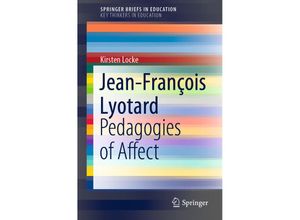This book gives an introduction to Jean-François Lyotard (1924-1998) as an educational thinker
whose philosophical encounters with politics and art offer a radical reconsideration of the
aims of education and the nature of pedagogy. The book approaches Jean-François Lyotard's
contributions to educational thought by placing his changing intellectual career within its
thematic and pedagogical context. Central chapters deal with Lyotard's key concepts utilised
throughout different phases of his intellectual career providing new openings and perspectives
to an affective form of pedagogy that questions the conditions and perimeters of the
educational endeavour as a learning and teaching event. Within these discussions Lyotard's
ideas about aesthetics and politics receive close attention. The book positions Lyotard's
pedagogical focus within key theoretical concepts traversed in his political and aesthetic
writings exploring his work on the political as an ethical activity art as resistance and
his later work on childhood and infancy as a state of openness and receptivity.

